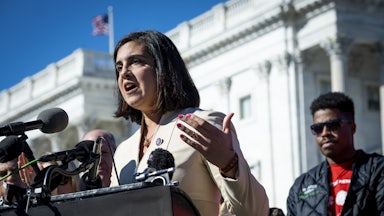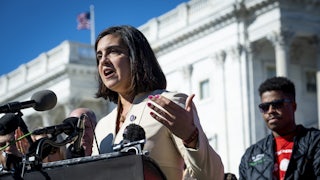Making good on a long-promised threat, Texas State Comptroller Glenn Hegar last week announced a list of 10 financial institutions and more than 300 funds his office deems to be “boycotting energy companies,” a.k.a. fossil fuels. Accordingly, state entities—including pension funds for teachers and government workers—will be required to divest from these financial institutions as the state moves to implement Senate Bill 13, which Governor Greg Abbott signed into law last year. Under the same bill, Texas has since September required any financial company entering into new contracts or renewing contracts with state entities to affirm they do not and will not “boycott energy companies.”
Since the Texas “energy discrimination elimination” law passed last year, similar efforts to fight what’s known as “environmental, social, and governance,” or ESG, criteria in investing have cropped up in at least 15 other state legislatures and passed in four. Republicans have begun to embrace the fight as an election issue, as well, turning “ESG” into a base-rallying bogeyman much like CRT, or “critical race theory.” The conservative argument in each case, as I’ve previously reported, is that any decrease in investment in oil, gas, and coal is a form of discrimination.
“You’ve seen a rise of something called ESG—environment, social, governance—where they will grade different companies based on how they’re performing on those metrics,” Florida Governor Ron DeSantis says over ominous music in a recent video, warning that “masters of the universe” are using their “economic power to impose policies on the country that they could not … at the ballot box.” The State Board of Administration that DeSantis serves on moved this week to ban that body from considering “social, political, or ideological interests” in decision-making about Florida pensions. As the anti-ESG movement racks up state-level wins, its biggest payoff may come at the national level: kneecapping U.S. financial regulators’ ability to respond to the climate crisis.
Officials from several of the same Republican-controlled states where anti-ESG efforts have taken root are rallying to stop a proposed Securities and Exchange Commission rule that would require publicly listed companies to disclose their greenhouse gas emissions. The comment period for the rule has just ended, but not before Republican attorneys general from 21 states filed their opposition, claiming the rule oversteps the SEC’s authority and runs afoul of the Supreme Court’s recent ruling in West Virginia v. EPA.
The attorneys general claim specifically that requiring publicly listed companies to disclose emissions would violate the “major questions doctrine,” the novel legal concept that the court’s right-wing majority, in its West Virginia v. EPA opinion, more or less invited litigants to use in challenging the administrative state. This doctrine holds that the court should review the executive branch’s interpretation of congressional statutes when such interpretations constitute questions of serious political or economic significance.
Unsurprisingly, then, the attorneys general’s rhetoric about the proposed rule has been noticeably hyperbolic, suggesting a rule merely requiring companies to disclose information to the SEC, as they do regularly, is nothing less than all-out war on American identity. “The woke left is going full throttle in their mission to change every facet of American life,” West Virginia Attorney General Patrick Morrisey said, “and erode our democratic institutions to suit their liberal agenda. The Biden administration wants to radically transform the SEC and other agencies run by unelected bureaucrats and make them champions of climate change.”
The comment sets the stage for a legal battle that could thwart the SEC’s and potentially other agencies’ ability to reckon with physical reality as temperatures rise. “The door may close on that before anyone realizes what’s going on,” says Sarah Haan, a law professor at Washington & Lee University. In addition to the major questions doctrine, the new rule is also likely challenged on First Amendment grounds. Republican attorneys general raised the possibility in their comment as well. If so, Haan says, it could open a “Pandora’s box” of constitutional challenges to securities regulation in general.
There are a number of ways to insulate climate-related financial regulations from legal challenges. “The SEC should be really clear about the purpose of the rule,” Haan argues, and—per its mandate—articulate emissions disclosures as protecting the interests of both investors and the public. “The climate risk rule is a continuation of long-standing securities regulation,” she adds. “It’s not radical or new, it’s just a continuation of the kinds of security regulation that we’ve always had,” including corporate disclosures that cover the many other sorts of risks investors might face. Madison Condon, a professor at Boston University School of Law, adds that using the protections around systemic risk established by Dodd-Frank—in some ways a more natural fit for evaluating climate change’s impact on the financial system—could provide additional protections for prospective new rules at the Treasury and Federal Reserve.
Time may be running out to get those up and running, though. Should Republicans take Congress and the White House come 2024, they could both tear up regulations enacted at the end of the Biden administration and prevent the federal government from issuing rules that are “substantially similar” in the future. The Trump administration did exactly that. Within his first year in office, Republicans used the Clinton-era statute to target 130 executive orders, Cabinet-level agency decisions, Congressional Review Acts, and even bills that would impact older laws. Seventy of those nixed rules related to the environment.
Fossil fuel companies and dark-money groups have funded the recent attacks on ESG, as well as those on other efforts to regulate polluters. The Republican Attorneys General Association has accepted millions of dollars from fossil fuel interests, including a $100,000 donation last year from the American Petroleum Institute. The Texas Public Policy Foundation has taken plenty of fossil fuel cash, too, and has heartily backed the S.B. 13 push while working to export it as a model for other states. Funders for the lesser-known State Financial Officers Foundation—a network of state treasurers that’s been pushing anti-ESG measures around the country and opposed former Deputy Treasury Secretary Sarah Bloom Raskin’s nomination to the Federal Reserve—include a hodgepodge of financial institutions, including some targeted by the Texas bill and whose websites extoll their commitment to ESG principles.
Enterprising grifters are also cashing in on the trend. “Anti-woke” money manager Strive ($DRLL), which launched this year with backing from Peter Thiel, recently announced it has $250 million in assets under management, building on a $20 million seed funding round in May. As Alex Kotch pointed out for the Center for Media and Democracy, which first reported anti-ESG efforts late last year, Hegar introduced Strive founder Vivek Ramaswamey at the American Legislative Exchange Council’s annual conference in July, where he talked about his book Woke Inc: Inside Corporate America’s Social Justice Scam.
The battle over ESG is on some level one between different arms of capital with different political leanings; the fossil fuel companies helping back anti-ESG efforts inordinately lean right and have an obvious interest in wanting to keep as much investor cash as possible parked in their industry. Banks and asset managers tend to vote blue and take a longer-term view of fiduciary responsibility, looking to insulate returns on their broad portfolios from the considerable financial risks posed by climate change.
Condon also sees it as bigger than that. Asset managers’ prominence, she explained, is a relatively recent development. After the financial crisis, low interest rates sent institutional investors searching for the kinds of steady yields they were used to getting from U.S. Treasury securities. Asset managers—with affordable passive investment funds—were ready and eager to provide. Blackrock now controls a whopping $10 trillion of assets, up from just $1 trillion in 2009. Altogether, the Big Three asset managers (Blackrock, Vanguard, and State Street) own roughly 20 percent of the average company listed on the S&P 500. Those shares give a small handful of companies considerable sway over a broad swath of corporate America—and can in practice allow them to override the decisions of the executives who manage firms. “This has really become a fight, also, between the CEO class and the asset manager class,” Condon said. It’s the CEOs, Haan notes, who control where corporations spend their lobbying efforts. “They stand in a position to say to candidates and party officials, ‘It’s really important for us to kill ESG.’ We’re starting to see politicians stepping up on a multipronged assault on ESG from all angles,” she said.
The purpose of laws like S.B. 13 and their copycats is to prevent companies like Blackrock from using their sizable share positions to enforce a “woke” green agenda, mainly through their votes on shareholder resolutions. That’s why Texas officials have accused Blackrock of “boycotting energy companies,” despite the $108 billion the company has invested in Texan energy companies, which would seem to disqualify it.
Jason Isaac, director of the Texas Public Policy Project’s Life:Powered Initiative, who’s led the group’s anti-ESG work, says Blackrock is “using that investment muscle to make that board adopt resolutions that are contrary to the best interest of their business” and “is more concerned about stakeholders than shareholders, and that’s not capitalism.” While they tend to behave similarly, Blackrock’s main competitors—Vanguard and State Street—were not included on the comptroller’s list. Asked why, a representative from Hegar’s office said the companies “must have responded” to their questionnaire, “and they must have succeeded in asserting an ordinary business purpose,” as opposed to an ideological one.
Blackrock has criticized the list, calling it “anti-competitive.” In an emailed statement, a Blackrock representative said that “elected and appointed public officials have a duty to act in the best interests of the people they serve. Politicizing state pension funds, restricting access to investments, and impacting the financial returns of retirees is not consistent with that duty.”
Ironically, the Texas comptroller’s office did not evaluate how firms actually voted in shareholder meetings when compiling its list, due “to the amount of voting data required to be reviewed.” If it had, it might have found that Blackrock backed fewer than half of environmental and social shareholder resolutions last year and plans to support “proportionately fewer” this year, according to a recent commentary the company published on its investment stewardship approach, “as we do not consider them to be consistent with our clients’ long-term financial interests.”
Anti-ESG efforts have also taken aim at a number of investor-led climate initiatives, including Climate 100 and the Glasgow Financial Alliance for Net Zero, comprising the Net Zero Banking Alliance and Net Zero Asset Managers Initiative. In Arizona, Attorney General Mark Brnovich has launched an investigation into whether Climate 100 violates antitrust rules. “Wall Street banks and money managers are bragging about their coordinated efforts to choke off investment in energy,” he wrote this March in The Wall Street Journal.
For climate advocates critical of the often vague label of ESG, all of this is profoundly ironic: Banks and asset managers continue to pour prodigious amounts of money into fossil fuel companies. One-third of the climate-themed funds analyzed by the U.K. think-tank Common Wealth in 2020 held oil- and gas-producing companies. As European regulators are in the midst of trying to crack down on what financial products can use the ESG label, nearly a quarter may not qualify, according to the research firm Morningstar. The German headquarters of Deutsche Bank and that of its asset management arm were recently raided by authorities for misleading investors about how “green” various investment products they offer really are.
Anti-ESG measures stateside may well come back to bite the states passing them. Texas’s law barring public contracts with blacklisted companies is already estimated to have cost the state between $303 and $532 million, according to a recent study by Daniel Garrett and Ivan Ivanov, of the University of Pennsylvania and the Federal Reserve Board, respectively. That figure, they explain, accounts for just one way in which the contracting bill has cost taxpayers: big municipal bond underwriters fleeing the state. Because no state entity can enter into new contracts with firms that don’t sign a fossil fuel loyalty pledge, cities and school districts looking to raise funds on the municipal bond markets—for things like new schools or upgrading water systems—have had to seek out new partners and underwriters, generally smaller firms that can’t offer rates that are competitive and may be struggling to take on new business from the companies that walked away from Texas as a result of the bill. On average, Ivanov and Garrett find that the law saddles state entities with paying interest rates some 15 basis points higher than they would otherwise. As of the start of this year, Blackrock managed $10 billion worth of bonds issued by the state of Texas and its various municipalities, which won’t be impacted by S.B. 13 since those contracts already exist. (Hegar’s office declined to comment on the study.)
Other impacts could be far greater, leaving pensioners exposed to the many ways climate change will hit the economy—and potentially their own retirement savings—in years to come. “I think it’s already having a chilling effect,” Condon says of financial institutions’ willingness to address climate issues. Among the criteria Hegar’s office considered in compiling its blacklist was the “extent of engagement of the board of directors on perceived climate risk.” Firms that even consider the effect devastating droughts, wildfires, and storms might have on their portfolio, that is, could stand to lose business just for looking into it. “This is definitely one of the many disincentives for Blackrock or more actively managed funds to take climate change seriously,” Condon says. “You cannot look at our economy and think we’re prepared for climate change.”










